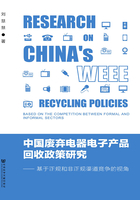
Abstract
At present, China has not established a sound system in recycling and reusing waste electrical and electronic equipment(WEEE), and the informal recycling sector without official qualifications for disassembling WEEE has captured a big market share of used products. As an industry with a public welfare property, the recycling industry cannot live without the supports from policies. Since 2009, China has formally entered the government-subsidized recovery mode. From the perspective of competition between formal and informal recycling sectors, the book studies the impacts of home appliances old-for-new policy and fund subsidy policy on recycling industry, and explores the recycling mechanism of improving the formal sector's competitiveness, in order to provide policy suggestions in regulating the development of China's recycling industry.
The book first studies the recycling competition between formal and informal sectors, and uses game theory to establish dismantling competition model and refurbishing competition model. Results show that the formal sector does not have the cost advantage in old products acquisition, recycling and reusing,leading to a low profit margin which decreases the acquisition price, and thereby causing less acquisition quantity, so the situation of“being hungry”is exacerbated for the formal sector.
Based on the above research, the book continues to study the home appliances old-for-new policy, and analyzes the implementation effects and existing problems. A standardized WEEE recycling and reusing system is proposed, which introduces enterprises cooperation based on the original old-for-new implementing system, and an environment-friendly credit model is built to prove the feasibility and rationality of the system. With respect to the old-for-new practices of some producing and sales enterprises, the book builds the old-for-new model in the supply-chain level and examines the impacts of market cooperation mechanisms on improving the formal sector's competitiveness.
The book next studies the fund subsidy policy. By introducing two acquisition pricing strategies, the book establishes dynamic game models of single pricing and quality-based pricing, and discusses the role of fund subsidies in supporting the development of the formal sector under different scenarios. Results show that subsidies can support the formal sector but the marginal effects are not as promising. The book also analyzes the impacts of the presence of secondary market and cooperation with manufacturers on the formal sector.
Finally, the book provides industry practices suggestions and policy implementations recommendations from three aspects: the formal sector's operation improvement, policy and society environment to enhance the formal sector's competitiveness, and encouraging the producing and sales enterprises' participation in recycling WEEE.